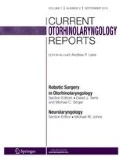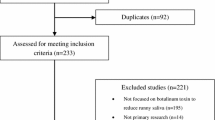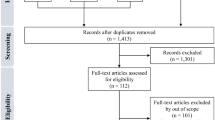Abstract
Purpose of Review
Globus pharyngeus is a persistent or intermittent, painless sensation of a foreign body in the throat that represents around 4% of ENT referrals from primary care. The aetiology of this condition is poorly understood and therefore there is no current universally accepted investigation pathway or treatment approach. This review aimed to provide a summary of the established evidence for the treatment of globus pharyngeus. The review used an eight-step, rapid review methodology to create an evidence summary.
Recent Findings
Recent case-control studies have demonstrated positive results in the treatment of globus using selective serotonin reuptake inhibitors and amitriptyline. Positive findings were also seen with the use of proton pump inhibitors, cognitive behavioural therapy and speech and language therapy.
Summary
Despite positive conclusions, strength of evidence is limited by lack of control groups in most studies, short follow-up periods and small study populations. Therefore, there is much room for further research studies and subsequent meta-analysis to move towards an evidence-based treatment algorithm. The authors suggest a case by case approach to the management given the evidence but recommend consideration of speech and language therapy review and potentially cognitive behavioural therapy in intractable cases.
Similar content being viewed by others
References
Papers of particular interest, published recently, have been highlighted as: • Of importance
Ali K, Wilson J. What is the severity of globus sensation in individuals who have never sought health care for it? J Laryngol Otol. 2007;121(9):865–8.
Joiner M, van der Kogel A. Basic clinical radiobiology. 5th ed. Boca Raton: CRC Press; 2018.
Purcell J. A treatise of vapours or hysteric fits. 2nd ed. London: Edward Place; 1707.
Batch A. Globus pharyngeus (Part I). J Laryngol Otol. 1988;102:152–8.
Moloy PJ, Charter R. The globus symptom. Incidence, therapeutic response, and age and sex relationships. Arch Otolaryngol. 1982;108(11):740–4.
Kortequee S, Karkos P, Atkinson H, Sethi N, Sylvester D, Harar R, et al. Management of globus pharyngeus. Int J Otolaryngol. 2013;2013:1–5. https://doi.org/10.1155/2013/946780.
Tang B, Cai HD, Xie HL, Chen DY, Jiang SM, Jia L. Epidemiology of globus symptoms and associated psychological factors in China. J Dig Dis. 2016;17(5):319–24.
Chevalier JM, Brossard E, Monnier P. Globus sensation and gastroesophageal reflux. Eur Arch Otorhinolaryngol. 2003;260:273–6.
Chen CL, Tsai CC, Chou AS, Chiou JH. Utility of ambulatory pH monitoring and videofluoroscopy for the evaluation of patients with globus pharyngeus. Dysphagia. 2007;22:16–9.
Corso MJ, Pursnani KG, Mohiuddin MA, Gideon RM, Castell JA, Katzka DA, et al. Globus sensation is associated with hypertensive upper esophageal sphincter but not with gastroesophageal reflux. Dig Dis Sci. 1998;43:1513–7.
Agada FO, Coatesworth AP, Grace AR. Retroverted epiglottis presenting as a variant of globus pharyngeus. J Laryngol Otol. 2007;121:390–2.
Webb CJ, Makura ZG, Fenton JE, Jackson SR, McCormick MS, Jones AS. Globus pharyngeus: a postal questionnaire survey of UK ENT consultants. Clin Otolaryngol Allied Sci. 2000;25:566–9.
Khangura S, Konnyu K, Cushman R, Grimshaw J, Moher D. Evidence summaries: the evolution of a rapid review approach. Syst Rev. 2012;1:10.
Ryan R, Hill S. How to GRADE the quality of the evidence. In: Cochrane consumer and communication. 2016. Available at http://cccrg.cochrane.org/sites/cccrg.cochrane.org/files/public/uploads/how_to_grade_revising_1_december_2016.pdf. Accessed 2 Jan 2018.
Dumper J, Mechor B, Chau J, Allegretto M. Lansoprazole in globus pharyngeus: double-blind, randomized, placebo-controlled trial. J Otolaryngol Head Neck Surg. 2008;37(5):657–63.
Cheng CC, Fang TJ, Lee TJ, Lee LA, Chen TM, Chen CK, et al. Role of flexible transnasal esophagoscopy and patient education in the management of globus pharyngeus. J Formos Med Assoc. 2012;111(3):171–5.
Kirch S, Gegg R, Johns MM, Rubin AD. Globus pharyngeus: effectiveness of treatment with proton pump inhibitors and gabapentin. Ann Otol Rhinol Laryngol. 2013;122(8):492–5.
Nakano S, Iwasaki H, Kondo E, Miyazaki K, Shizuku H, Kamimura S, et al. Efficacy of proton pump inhibitor in combination with rikkunshito in patients complaining of globus pharyngeus. J Med Investig. 2016;63(3–4):227–9.
Millichap F, Lee M, Pring T. A lump in the throat: should speech and language therapists treat globus pharyngeus? Disabil Rehabil. 2005;27:124–30.
Khalil HS, Reddy VM, Bos-Clark M, Dowley A, Pierce MH, Morris CP, et al. Speech therapy in the treatment of globus pharyngeus: how we do it. Clin Otolaryngol. 2011;36(4):388–92.
Bishop LC, Riley WT. The psychiatric management of the globus syndrome. Gen Hosp Psychiatry. 1988 May;10(3):214–9.
Donohue B, Thevenin DM, Runyon MK. Behavioral treatment of conversion disorder in adolescence. A case example of globus hystericus. Behav Modif. 1997;21(2):231–51.
Motoo Y, Taga H, Su SB, Sawabu N. Effect of Koso-san on globus pharyngeus. Am J Chin Med. 1999;27(2):283–8.
Finkenbine R, Miele VJ. Globus hystericus: a brief review. Gen Hosp Psychiatry. 2004;26(1):78–82.
You LQ, Liu J, Jia L, Jiang SM, Wang GQ. Effect of low-dose amitriptyline on globus pharyngeus and its side effects. World J Gastroenterol. 2013;19(42):7455–60.
• Chen DY, Jia L, Gu X, Jiang SM, Xie HL, Xu J. Comparison of paroxetine and amitriptyline in the treatment of refractory globus pharyngeus. Dig Liver Dis. 2016;48(9):1012–7. This study used randomised control trial methodology and subjective outcome measures to compare the effects of paroxetine, amitriptyline and lansoprazole.
• Zhou WC, Jia L, Chen DY, Liu Y, Liu J, Jiang SM, et al. The effects of paroxetine and amitriptyline on the upper esophageal sphincter (UES) pressure and its natural history in globus pharyngeus. Dig Liver Dis. 2017;49(7):757–63. This study used upper oesophageal pressure measurements and subjective symptom assessment to quantify the effects of paroxetine, amitriptyline and lansoprazole.
Agada FO, Coatesworth AP, Grace AR. Retroverted epiglottis presenting as a variant of globus pharyngeus. J Laryngol Otol. 2007;121:390–2.
Burns P, O’Neill JP. The diagnosis and management of globus: a perspective from Ireland. Curr Opin Otolaryngol Head Neck Surg. 2008;16:503–6.
Khalil HS. The diagnosis and management of globus: a perspective from the United Kingdom. Curr Opin Otolaryngol Head Neck Surg. 2008;16(6):516–20.
Karkos PD, Wilson JA. The diagnosis and management of globus pharyngeus: our perspective from the United Kingdom. Curr Opin Otolaryngol Head Neck Surg. 2008;16:521–4.
Lee BE, Kim GH. Globus pharyngeus: a review of its etiology, diagnosis and treatment. World J Gastroenterol. 2012;18(20):2462–71.
Schindler A, Mozzanica F, Alfonsi E, Ginocchio D, Rieder E, Lenglinger J, et al. Upper esophageal sphincter dysfunction: diverticula-globus pharyngeus. Ann N Y Acad Sci. 2013;1300:250–60.
Author information
Authors and Affiliations
Corresponding author
Ethics declarations
Conflict of Interest
The authors declare that they have no competing interests.
Human and Animal Rights and Informed Consent
This article does not contain any studies with human or animal subjects performed by any of the authors.
Additional information
This article is part of the Topical Collection on LARYNGOLOGY: Dysphagia
Rights and permissions
About this article
Cite this article
Heyman, J., Owens, D. What Is the Available Evidence for the Treatment of Globus Pharyngeus?. Curr Otorhinolaryngol Rep 6, 189–195 (2018). https://doi.org/10.1007/s40136-018-0197-1
Published:
Issue Date:
DOI: https://doi.org/10.1007/s40136-018-0197-1




